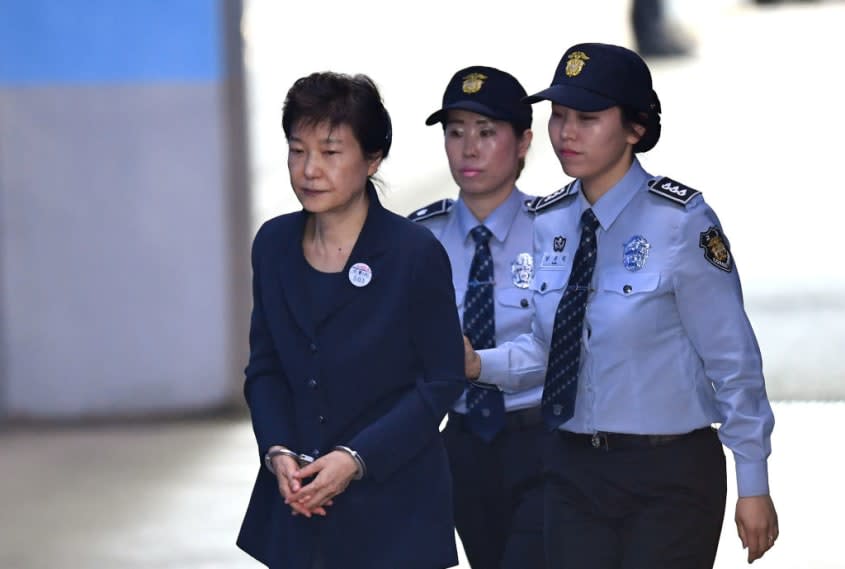World leaders who have been charged or imprisoned

- Oops!Something went wrong.Please try again later.
- Oops!Something went wrong.Please try again later.
- Oops!Something went wrong.Please try again later.
- Oops!Something went wrong.Please try again later.
- Oops!Something went wrong.Please try again later.
- Oops!Something went wrong.Please try again later.
Many Republicans have rallied around former President Donald Trump following his indictment for allegedly mishandling classified documents. One common notion is that charging or even imprisoning a former American president would set a bad precedent for nations around the world.
Former Vice President Mike Pence, who has split from his old boss and is now running for president himself, said during a CNN town hall that federally charging Trump "would send a terrible message to the wider world," though he admitted there needed to be "equal treatment under the law."
Sen. Lindsey Graham (R-S.C.) called the charges "absolutely ridiculous," telling ABC News that what Trump did was "very similar to what Hillary Clinton did." He also said that Trump's state charges in New York for allegedly falsifying business records had "never happened to anybody in history."
While Trump is the first American president to face criminal charges, instances of government leaders around the world being charged or even imprisoned are fairly common. While some in the GOP have claimed this only occurs in "banana republics," there are at least 78 countries, including many democracies, where "leaders who left office since 2000 have been jailed or prosecuted," Axios reported. Even some leaders currently in office are facing charges.
Park Geun-hye
The first woman to be elected president of South Korea, Park Geun-hye led her country from 2013 to 2017. In 2016, allegations of corruption and influence peddling emerged surrounding a plot to extort millions of dollars from large corporations. She was eventually impeached and removed from office, with South Korea's Constitutional Court saying her actions "betrayed the trust of the people and were of the kind that cannot be tolerated."
Less than a month after her ousting, Park was arrested on charges "including bribery, extortion and abuse of power." Following a lengthy trial, she was sentenced to 24 years in prison, though she was pardoned after serving five years and later returned home. Park was the second South Korean president in a row to serve prison time. Her predecessor, Lee Myung-bak, was sentenced to 17 years in prison "for corruption that could have kept him behind bars into his 90s," Bloomberg reported, though he was similarly pardoned and released.
Nicolas Sarkozy
Nicolas Sarkozy was the president of France from 2007 to 2012. Though he retired from public life after leaving office, he was charged with alleged corruption and bribery stemming from his time as president. Sarkozy was accused of trying to bribe a judge that was "looking into earlier allegations that during his 2007 presidential campaign Sarkozy took illegal payments from L'Oreal heiress Liliane Bettencourt," NPR reported.
Though the Bettencourt case was eventually dropped, prosecutors continued going after Sarkozy for allegedly bribing the judge, as well as looking into alleged bankrolling of his 2007 campaign by Libyan officials. In 2021, Sarkozy was found guilty in two separate corruption trials. He was sentenced to a combined one year on house arrest and one year in prison for his actions and recently lost an appeal against one of his convictions.
Benjamin Netanyahu
The current prime minister of Israel, Benjamin Netanyahu, has been marred by allegations of corruption for years. Israeli authorities first opened a criminal investigation into Netanyahu in 2016, and three years later he was indicted for alleged bribery, fraud and breach of public trust. He was suspected of "wrongfully accepting $264,000 worth of gifts, which prosecutors said included cigars and Champagne, from tycoons and of dispensing regulatory favors in alleged bids for improved coverage by a popular news website," Reuters reported.
The case against Netanyahu began in 2020 and is ongoing. The prime minister could face up to 10 years in prison if convicted, though reports emerged in 2022 that he was considering negotiating a plea deal. His critics say Netanyahu's continued reform push to weaken Israel's judiciary is "a way to open an escape route from his trial," The Associated Press reported, though he has denied these claims.
Cristina Fernández de Kirchner
Argentina's current vice president, Cristina Fernández de Kirchner, also served as the nation's president from 2007 to 2015 and first lady during the presidency of her husband, Néstor Kirchner. So while she's a mainstay in Argentinian politics, her two presidential terms were rocked by a series of corruption scandals. She was charged with treason in 2017 for allegedly covering up Iran's role in the bombing of a Jewish community center in Buenos Aires, but the charges were eventually dropped due to parliamentary immunity.
Kirchner's legal troubles would continue, though, when she was indicted on corruption charges in 2018 for allegedly "heading a network that received bribes in exchange for lucrative public works contracts during both her presidency," according to a copy of the charges seen by Al Jazeera. She was found guilty in 2022, sentenced to six years in prison and issued a lifetime ban from holding public office. Kirchner has "temporary immunity due to her current role [as vice president] so she will not immediately go to jail," CNN reported. Kirchner said she intends to appeal the verdict but will not run for reelection.
You may also like
'Spider-Man: Beyond the Spider-Verse': everything we know

